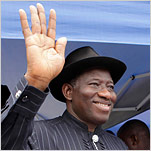I HAD never noticed how closely the syncopated rhythm of zydeco music echoes the rollicking stumble of horses on rough terrain. But on a September afternoon in the piney woods of Evangeline Parish, in Louisiana’s Cajun country, with hundreds of dusty horseback riders moving down a narrow trail, the kinship was impossible to miss. As the horses followed a tractor towing a D.J. and a zydeco-blaring sound system, they bucked and swayed in a cadence fit for the barroom floors of Lafayette, 70 miles away.
Louisiana’s Zydeco Trail

The Pineywoods Trail Ride, held in Beaver, La., last Labor Day weekend, is one of a circuit of zydeco trail rides that take place in Cajun country around Lafayette, La., and in parts of Texas. More Photos »
By SHAILA DEWAN
Published: April 22, 2011
Multimedia
Lee Celano for The New York Times
At the Pineywoods Trail Ride in Beaver, La., some get around on four legs and others travel on four wheels. More Photos »
Eventually the riders — young and old, encumbered by cold beers or small children — reached a large clearing in the middle of the woods, which quickly filled with horses, flatbeds, wagons and buggies as the music continued to throb. People sold barbecue sandwiches and turkey legs from the backs of pick-up trucks. A group of women piled out of a wagon and serenely performed a line dance in the dust. Young people sang and flirted and held up their beers with a “Wooo!”
The clearing was the halfway point of the Pineywoods Trail Ride, one of a circuit of zydeco trail rides that take place in the countryside around Lafayette and in many parts of Texas from Mardi Gras through early December. Exuberant, untouched by corporate sponsors and run by a close-knit network of people who price their beer at $2 a can, the rides are a traditional way to celebrate the cowboy culture of rural blacks or Creoles (commonly understood as a mixture of black with French, Spanish and/or Native American ancestry).
Originally small affairs among relatives and neighbors, the rides have evolved over decades into organized events with a dedicated following, though they have remained largely unknown to outsiders. In recent years, trail rides have surged in popularity among rural youth, as zydeco musicians have incorporated strains of R&B; and hip-hop, attracting a new generation for whom Creole is suddenly cool.
The Pineywoods ride, for which more than 2,000 people gathered over the course of three days, started and ended on a farm with an open-sided pavilion that, by the end, would be in a sorry shambles — its benches broken from the weight of people climbing up to get a look at the musicians, an industrial-size Dumpster outside overflowing with the detritus of revelry. It would be a huge, weird, miles-from-nowhere party, one that I had fantasized about for nearly five years.
IN July 2006, when my friend Lisa D’Amour and I embarked on a long, music-seeking weekend with Lafayette as our base, all we knew about zydeco trail rides had been gleaned from an endearingly amateurish Louisiana music fan site: they existed, they took place regularly on Sundays somewhere in the area and to find one, you might try listening to the local Cajun radio program. There was no mention of the fact that the program was in French.
Neither a more extensive Internet search nor the local newspapers got us any further. But the more elusive zydeco trail rides seemed, the more important it became to find one, even if it meant wasting an entire day.
We began our search with an inquiry at Prejean’s, a Cajun restaurant in Lafayette with a stuffed alligator in the entryway and a Webcam that provides worldwide access to views of tourists enjoying shrimp sassafras. Stupid questions are not a rarity at Prejean’s, but our waiter was stumped. Finally, he suggested we take a half-hour drive to Lawtell, the home of iconic zydeco clubs like the Offshore Lounge.
Lafayette is a small city, and you don’t have to go far in any direction before things turn very country, as in gas-station boudin and music venues that are open only on Saturday mornings. Travel south or east, and you will soon see signs for swamp tours; go north, toward Lawtell and Opelousas, and it’s scrub, forest and farms. We knew we had arrived when we saw a hand-painted sign: “Welcome to Lawtell, Home of the Town and Country Riders.” We found an old store that sold bait and rusty key chains, but when we mentioned trail rides, the white man behind the counter gave us a blank look.
At another gas station, a black cashier was more helpful, pointing us to an inebriated man buying a Sunday morning case of beer, who kindly led us to a large shade tree where a man was shoeing a horse. Several other men were hanging around, one of whom wore a rodeo championship belt buckle as big as a chicken-fried steak. Lisa and I looked at each other and grinned.
These men, we soon learned, were not the Lawtell Town and Country Riders, now defunct, but a different club, the Lawtell Low Riders. And yes, they could take us to a trail ride.














